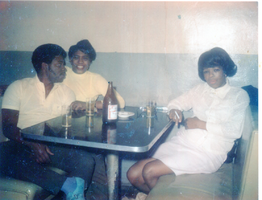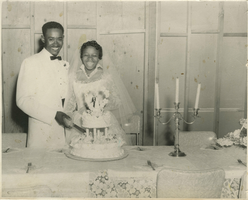Search the Special Collections and Archives Portal
Search Results
Faye Duncan Daniel oral history interview
Identifier
Abstract
Oral history interview with Faye Duncan Daniel conducted by Claytee White on October 18, 1996 for the Women's Research Institute of Nevada (WRIN) Las Vegas Women Oral History Project. In this interview, Daniel discusses moving to Las Vegas, Nevada in 1965. Daniel discusses living in Vegas Heights and her interactions with the local African American community. Daniel discusses her various jobs including a brief time as a police officer. Later Daniel discusses leaving Las Vegas to obtain her college education and her eventual return, to work as one of the first African American women in management in the Las Vegas hotel industry. Daniel also discusses her experiences with racism and gender discrimination.
Archival Collection
Melvin Sanders Jr. oral history interview
Identifier
Abstract
Oral history interview with Melvin Sanders Jr. conducted by John Grygo on February 18, 2013 for the African Americans in Las Vegas: a Collaborative Oral History Project. In this interview, Sanders discusses his personal history and his experiences growing up in Las Vegas, Nevada. He describes the development of West Las Vegas, his father being a pastor at the House of Holiness church, and talks about other spiritual leaders in the community. Later, Sanders discusses the riots after the assassination of Martin Luther King Jr. and how African American entertainers were limited in where they performed on the Las Vegas Strip. He talks about Jackson Street, the increase of police on the Westside, and racial tensions in the mid 1970s. Lastly, Sanders recalls when casinos begun integrating, and he describes starting an automobile detailing business, J.R. Detailing.
Archival Collection

Photograph of Vera Lee Stafford and Friends at the Brown Derby
Date
Archival Collection
Description
Dell Ray Rhodes' mother, Vera Lee Stafford (far right), with friends at the Brown Derby.
Image
Lonnie Pittman oral history interview
Identifier
Abstract
Oral history interview with Lonnie Pittman conducted by Beverly Williams on March 16, 1981 for the Ralph Roske Oral History Project on Early Las Vegas. In this interview, Pittman, an African American man, describes the treatment and living conditions of African Americans in Las Vegas, Nevada during the 1950s. Pittman also discusses the job opportunities available to African Americans, segregation, and the quality of schooling available to African American children at the time.
Archival Collection

Photograph of Eddie and Johnie Wright at their wedding reception, April 25, 1957
Date
Archival Collection
Description
Photograph of Eddie and Johnie Wright cutting the cake at their wedding reception.
Image
Donna Rodriguez oral history interview
Identifier
Abstract
Oral history interview with Donna Rodriguez conducted by Justin Burrows on November 24, 2014 for the African Americans in Las Vegas: a Collaborative Oral History Project. In this interview, Rodriguez discusses her personal history and moving to Las Vegas, Nevada in 1993. She describes her first impressions of the city, her employment at McCarran International Airport, and working as a security dispatcher for casinos. Rodriguez then talks about the development of security surveillance at casinos, discrimination towards African American gamblers, and recalls the training she received. Later, Rodriguez discusses her church involvement, teaching at her church's Sunday school, and shares how she managed to raise her children on her own. Lastly, she talks about the role that politics had on minority communities, the importance of education, and changes in Las Vegas.
Archival Collection

Transcript of an Interview with Sonny Thomas by Barbara Tabach on February 28, 2013
Date
Archival Collection
Description
Sonny (Sandy C.) Thomas is from Fordyce AR. He worked in hotels for over 30 years before securing job as funeral director for which he was trained.
Text
Marlena Shaw oral history interview
Identifier
Abstract
Oral history interview with Marlena Shaw conducted by Claytee D. White on December 12, 2017 for the African Americans in Las Vegas: a Collaborative Oral History Project. In this interview, Shaw discusses her early life in New Rochelle, New York and growing up in a musical family. She talks about her initial interest in singing, her career as a jazz singer, and performing with Count Basie in Las Vegas, Nevada. Shaw recalls recording her first studio album, and the discrimination she faced as an African American musician. Shaw describes performing at the Sands Hotel and Casino, touring around the world, and working with multiple recording labels. Later, Shaw remembers performing with Sammy Davis Jr. Lastly, Shaw discusses the significance of spirituality in her life, and her first time performing with a symphony orchestra.
Archival Collection
Ronnie Bank oral history interview
Identifier
Abstract
Oral history interview with Ronnie Bank conducted by Lael Byrd on November 30, 2014 for the African Americans in Las Vegas: a Collaborative Oral History Project. In this interview, Bank discusses his personal history and growing up in Las Vegas, Nevada. He talks about his employment at the Las Vegas Hilton (currently Westgate Las Vegas Resort and Casino) and Circus Circus Hotel and Casino. Bank then describes nightlife and entertainment on the Strip in the 1980s, discrimination at night clubs, and West Las Vegas entertainment. He goes on to describe the riots following Rodney King’s death, the challenges with interracial relationships, and why families began moving away from the Westside. Lastly, Bank discusses working as a disc jockey (DJ) in Las Vegas, African American radio stations, and the development of the Westside.
Archival Collection
Clinton Wright and Aaron Mayes oral history interview
Identifier
Abstract
Oral history interview with Clinton Wright and Aaron Mayes conducted by Barbara Tabach on February 21, 2017 for the African Americans in Las Vegas: a Collaborative Oral History Project. In this interview, Wright discusses being a photographer of the Westside community in Las Vegas, Nevada. He recalls creating his first photographic prints, being a freelance photographer, and experimenting with photography techniques. Wright talks about his employment with the
Archival Collection
